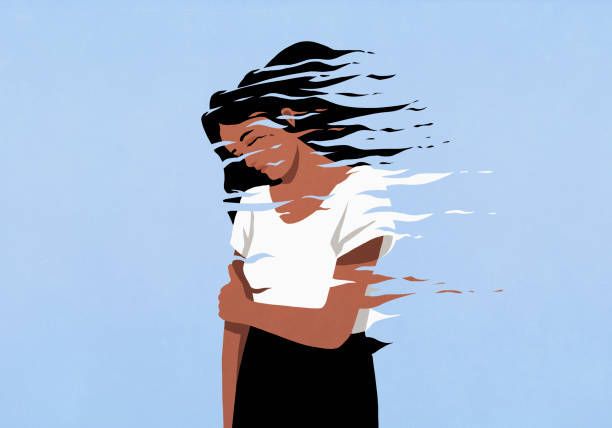By: Sahra Mohamed
Sibling relationships are often romanticized as lifelong bonds that withstand the test of time. However, for many, these relationships can cause deep emotional distress, especially when boundaries are disregarded and there’s no respect. While conflicts among siblings are normal, there are cases where the best option for one’s mental health is to sever ties entirely. Psychologists have long studied sibling relationships, recognizing that while they can provide support, they can also be harmful. Research has found that sibling aggression is linked to increased mental health distress in adults. This includes emotional manipulation, verbal abuse, and physical aggression, behaviors often mistaken for “sibling rivalry” when they are not. For example, a 2024 article from The Guardian, explores how sibling abuse, including verbal and emotional aggression, can cause lasting psychological trauma, resulting in low self-esteem and social anxiety.
A key issue in toxic sibling relationships is gender dynamics. Many women feel unheard, disrespected, or emotionally abused by their brothers, with these behaviors often excused as boys being “rough” or “dominant.” One of the most damaging behaviors in toxic sibling relationships is when a man dismisses his sister’s health concerns. This can lead to stereotypes, labeling women as “emotional” if they can’t cope with the abuse or disrespect. This dismissiveness can show up in different ways, from downplaying her physical symptoms to rejecting her emotional and psychological needs. Such behavior not only invalidates her experiences but also worsens the emotional impact of existing health issues. These actions undermine the trust and safety that should be present in family relationships.
In an article published on Parents.com, toxic family dynamics, including emotional manipulation and abuse, contribute to higher levels of anxiety, depression, and lower self-esteem in adulthood. Families that fail to set clear boundaries or engage in abusive behaviour can cause emotional distress, making it difficult for individuals to build healthy relationships and see themselves in a positive light. The act of dismissing a sibling’s health concerns is often influenced by societal and gender expectations. Historically, women’s health complaints have been downplayed or ignored not only within family structures but also in medical contexts, as reported in The New York Times.
Gender stereotypes within families can lead to delays in treatment and a lack of emotional support. Research shows that female caregivers devote more time to caring for others and face greater criticism than men, highlighting the impact of traditional gender roles in caregiving. A report from the Women’s Health Group in Chicago, shows that without emotional support from family, individuals with chronic illnesses or mental health challenges struggle more to cope with their health issues. Further research indicates that sibling bullying is linked to increased risks of anxiety, depression, and even post-traumatic stress disorder (PTSD) in adulthood. A study in Pediatrics, found that children who experience aggressive behavior from siblings suffer similar emotional distress as those bullied by peers. Dr. Joshua Coleman, a psychologist specializing in family estrangement, emphasizes that individuals should not feel guilty about distancing themselves from family members who consistently invalidate or harm them. He emphasizes the importance of prioritizing one’s mental health over famiy obligations. For more insights, you can watch Dr. Coleman’s discussion on family estrangement by clicking here.
Some parents recognize the issue and attempt to intervene but their efforts may not work if the problematic sibling refuses to be held accountable. In these cases, parents can only do so much. When the toxic behavior continues, the sibling being harmed often has to set boundaries and make tough decisions to protect their well-being. It becomes even more challenging when the eldest sibling is sharing the burden of additional responsibilities and contributing to the household. In some families, including single-parent households, eldest siblings are expected to take on more, which can result in them being taken advantage of and subjected to abuse by their siblings. This intensifies the emotional distress they experience. Despite one’s hard work and efforts, being disrespected by those closest to them is disheartening, especially when it can’t be addressed appropriately due to the manipulative tactics used by the aggressor. Society often pressures people to “keep family together,” even when toxic dynamics are involved. However, protecting your mental health sometimes means taking action and doing what’s best for you.
Here’s how to approach that decision:
Assess the Cost of Staying: Does the relationship cause more stress than peace?
Seek Professional Guidance: Therapy can help understand family issues and decide the best course of action.
Set Boundaries: If cutting ties isn’t possible, limit interactions and set clear emotional boundaries.
Understand Guilt: Feeling guilty is common, but prioritizing mental health is not selfish. Family should be about respect, care, and safety.
If a sibling repeatedly disrespects or harms another, that person has the right to step away for their peace. Estrangement is difficult, but sometimes it’s the necessary step for healing. The societal narrative that “family always comes first” should be challenged when it causes harm. Cutting ties with a toxic sibling is not an act of betrayal, it is an act of self-love. You are not alone in this decision, and you do not owe anyone your peace, even if they share your DNA.



Leave a Reply